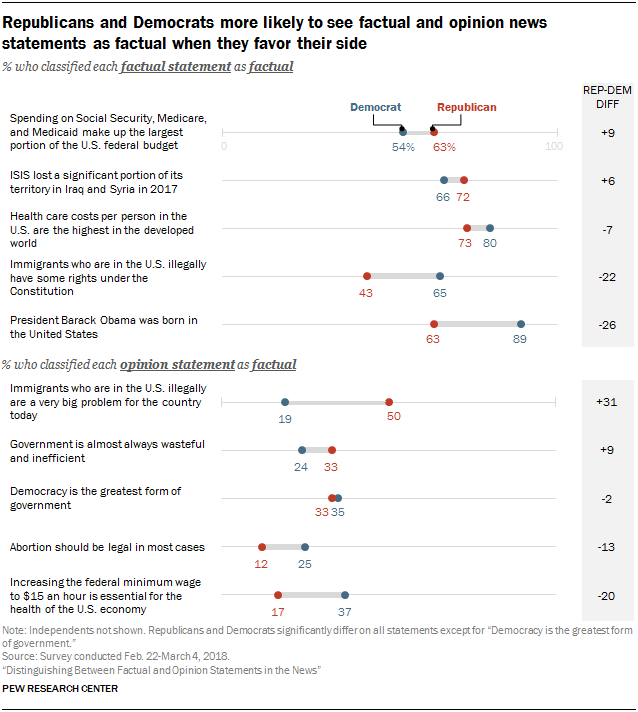Democracy, Current Events
Don’t Be Unfair to News Viewers
But the study seems poorly designed, with questionable examples. Here is the list of statements they wanted participants to evaluate:
Two issues:
First, this trades on a questionable and controversial view about whether normative statements are objective and provable. American K-12 schools dogmatically teach the view that all normative statements are subjective and mere opinion, but that’s in fact (and this is not mere opinion) a highly controversial philosophical claim. See this NY Times blog complaining about this: https://opinionator.blogs.nytimes.com/2015/03/02/why-our-children-dont-think-there-are-moral-facts/
Second, the normative statements in the bottom are what we might call “thick” rather than “thin” normative claims. A thin claim simply offers an evaluation, e.g., “Crooked Timber is bad.” A thick claim contains both normative components but also encapsulates, presupposes, encompasses, or in some way contains background descriptive claims. For example, “Nancy MacLean is intellectually dishonest” or “Michael Huemer is brave.”
Most of these statements are “thick” in that sense.
Is government wasteful and inefficient? I’m not sure if that is to be interpreted entirely as an opinion claim, or whether it is not entirely provable. “Efficiency” has multiple descriptive meanings in economics. “Wasteful” can be seen as a slightly normatively loaded version of “inefficient”; e.g., “This engine is less efficient than that engine, so it’s wasteful.” Economists regularly make claims like this when studying various institutions, and they see themselves as doing descriptive, positive work.
Are immigrants a big problem? Again, this question presupposes some normative commitments. However, we also tend to summarize descriptive claims in normative ways when the background normative commitments are shared. Someone reading this might think the statement is–as it often would be in conversational English–a way of summarizing a longer statement: “Immigrants cause crime, undermine social cohesion, and strain government budgets by consuming public goods, schooling, and social insurance.” (Note that I do not endorse these descriptive claims.) Similarly, if a medical doctor said, “Jason, your cancer is a aggressive and is going to be a big problem,” I wouldn’t think to respond, “Just give me the facts, doc.” Instead, it’s a way of summarizing such things as “The cancer has metastasized and is unlikely to respond to common treatments.”
Similar comments apply to the other opinion statements. Yes, they contain normative components, but nevertheless, the study both A) presupposes a problematic view about the objectivity of normative statements and B) seems to ignore or have questionable views about the pragmatics of thick normative statements.
Come on, Pew. If you’re making me defend democracy you’re doing something wrong.
HT: Walker Wright


